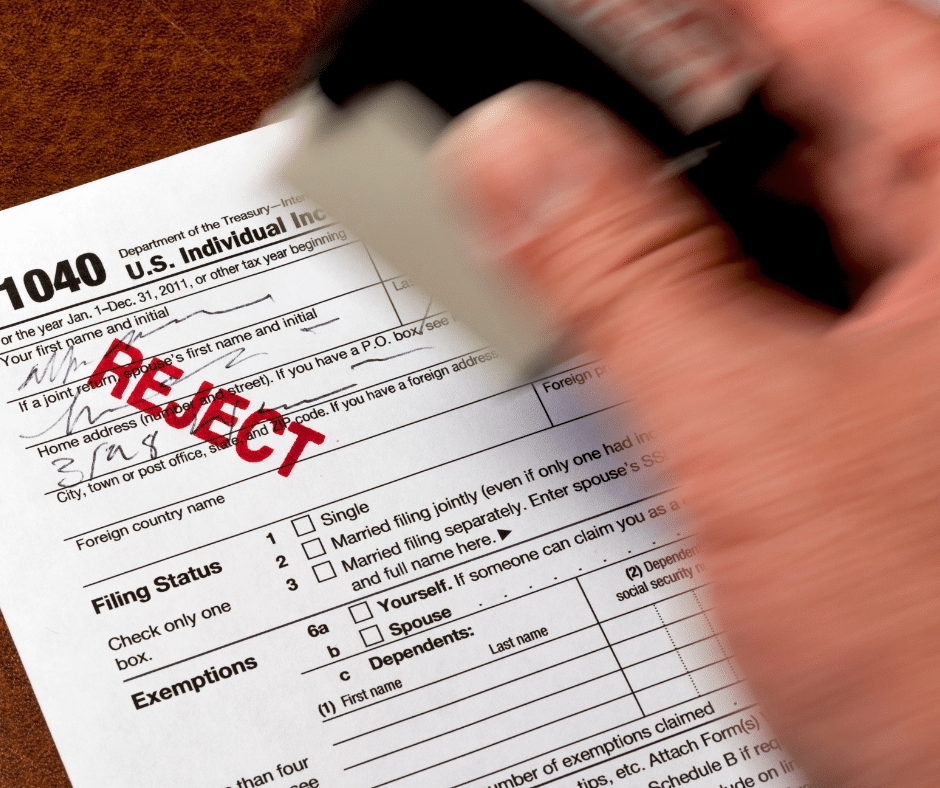5 Simple Steps to Fix Rejected Tax Returns for Expats

You spent days, perhaps even months, wrestling with receipts, forms, and numbers to prepare your tax return. After countless hours of hard work, you finally completed it. You breathed a sigh of relief as you hit the file button.
But, just when you thought it was over, unexpected news arrived. The IRS rejected your tax return. Frustration and confusion gripped you. You had done your best to prepare everything accurately.
What could’ve gone wrong?
It’s not uncommon for the IRS to reject a return. The tax agency processes over 100 million returns yearly, and thousands get rejected. There are several reasons why this happens.
The good news?
They’re generally easy to fix.
In this blog post, we’ll teach you five things to do when the IRS rejects your tax return and provide tips to ensure a successful filing.
1. Find out the reason for rejection.
If you e-filed your tax return, the IRS will typically notify you within a few hours if it didn’t accept your return. For mailed returns, the IRS will send a notice to your address. The letter will include a code that explains the specific reason for rejection. Some common reasons include:
- Typos in name or mismatched social security number
- Missing signature on a paper return
- Dependent claimed on a previously submitted tax return
- Duplicated tax return
2. Correct the error.
Once you find the mistake, the next thing to do is fix it. If you file using tax software, you can correct the error right in the program. If you have a tax pro helping you, it’s their job to fix it for you. However, they may ask for additional information if necessary.
Remember, don’t file an amended return for a rejected one. You only do that if the IRS already accepted your tax return but you need to make changes, such as to your income, filing status, deductions, or tax amount.
3. Submit your corrected tax return.
Once you’ve made the changes, submit the corrected return as soon as possible. If you get the rejection notice before April 15, you have until then to send in the corrected version. If you initially filed your return on time but the IRS rejected it, don’t worry. They will not count it as late if you fix it and send it within five days of getting the notice.
4. Paper file duplicated return.
When someone uses your SSN to file a tax return, it could mean someone is stealing your identity or committing fraud. Scammers might do this, especially if they want to take your refund money.
If this happens, you’ll need to print and mail your return. The IRS will require you to fill out Form 14039 (Identity Theft Affidavit) and include it with your tax return. You’ll also need to send in documents like your W-2 or 1099 forms. The IRS will investigate to figure out which return is real. If you’re owed a refund, don’t worry. The IRS won’t send it out until they finish their investigation.
5. Wait for the acknowledgment.
After you send in the corrected return, be sure to monitor for acceptance. If you e-filed, the IRS should send you an acknowledgment within a few hours or days. If you mailed it, you can use the tracking number to see if the IRS received it.
You can also call the IRS or log in to your IRS online account to check your return status. If you’re expecting a refund, use the Where’s My Refund tool on the IRS website to keep track of any updates.
A rejected return can be concerning, but don’t panic. The steps above can help solve the issue. However, it’s better to prevent it from happening than to fix it later.
Here’s what you can do.
Prepare ahead so you have enough time to review your tax return and make any needed changes. If your tax situation changes, update your IRS records right away. If you have an Identity Protection PIN, keep it handy. But, if you forgot, ask for a new one before you file. Most importantly, double-check everything before you send in your tax return to make sure it’s all correct.
If you need assistance preparing your tax return, contact Tax Samaritan at 775-305-1040 for a free 15-minute, no-obligation consultation meeting. With us, you can have the highest level of peace of mind about your taxes.


